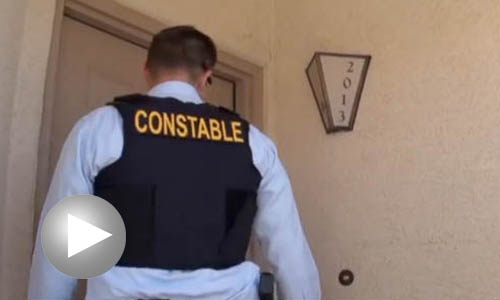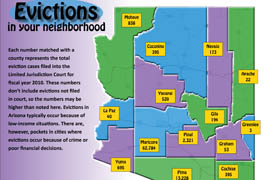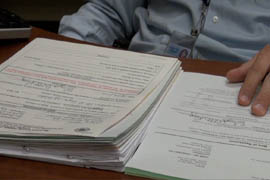POVERTY – As the economy struggles, eviction numbers drop by the thousands

As the economy struggles, eviction numbers drop by the thousands
Maricopa County will likely see more than 18,000 evictions this year, according to David Alster, administrator of constables. But before the economy went south, Alster said, the department averaged more: about 22,000 evictions per year. What happens is that people are better able to purchase homes in a down economy, leaving fewer renters. That means apartment complexes accept renters who wouldn’t normally qualify. Video by Brittny Goodsell.
By Brittny Goodsell
TEMPE – Constable Brandon Schmoll typically speaks to people in a calm voice. He’s quiet, he’s friendly, he’s relaxed.
Then he puts on a constable vest designed to stop a normal handgun bullet, and checks his side for his small semi-automatic .40-caliber pistol.
His demeanor changes instantly. He’s alert. He’s prepared.
And he gets loud.
Today, he’s at an apartment complex in Tempe to evict someone he’s already evicted at least four times. The renter is overseas at the moment, so Schmoll doesn’t expect to pull his gun in self-defense, something he’s had to do before.
“I never look forward to doing an eviction, ever.”
He follows the maintenance man up the stairs to the apartment and knocks loudly.
No answer. He knocks again.
Then he turns the lock.
“Maricopa County constable. Anyone here?” he yells. “Hello?”
As the constable walks around the apartment, the maintenance man changes the locks. There’s a big-screen TV. A water pipe used to smoke marijuana sits on the kitchen counter.
After a short walk around the apartment, a fluorescent hunter-orange sign is placed on the door with the word “WARNING” at the top to inform the renter he has been evicted.
The process takes less than five minutes. Constable Schmoll will conduct a dozen more evictions before his day ends.
Maricopa County likely will see more than 18,000 evictions this year, according to David Alster, administrator of constables.
But before the economy went south, Alster said, the department averaged more: about 22,000 evictions per year.
Why the drop in recent years? It’s because a poor economy means fewer evictions.
What happens is that people are more able to purchase homes in a down economy. In turn, there are fewer renters. That means apartment complexes accept renters who wouldn’t normally qualify.
“[The complex] is hurting, and they need more people in there,” Alster said. “It probably means they are not the best renters in the world.”
Each constable’s precinct offers a different story of evictions.
The bulk of evictions that Schmoll delivers – mainly in parts of Tempe and Ahwatukee – are made up of people who made poor financial choices by buying expensive items before paying rent or utilities, or people being evicted because of crime or drugs.
Schmoll, who used to be a financial adviser, said he often walks into an apartment and can quickly measure what to cut out of a budget in order to make that missed rent payment.
But when the eviction involves a low-income household – especially one that includes children – it’s harder to measure what to cut, if anything.
“This job will absolutely tear at your heart,” he said. “I will have nightmares.”
He said he thinks about evicted kids, who are at the mercy of their parents’ financial decisions, and wonders how the children are today.
Alster said the typical eviction in Maricopa County, especially in areas such as Glendale and central Phoenix, involves a low-income household.
“A lot of the times there is a just a mattress on the floor and there is not much clothes in the closet,” Alster said.
“It’s real rough,” he said. “People ask me if I can do the job and I say, ‘No.’”
Schmoll said carrying out an eviction is always stressful because people feel like their safe space is being violated. People get verbally abusive, and some have grabbed weapons when constables come with eviction notices.
Alster said there have even been a few suicides because of evictions. A few years ago, one man shot himself with a rifle before the constable walked in. In another instance a resident hung himself.
Although Schmoll has never fired his weapon in self-defense or seen a resident commit suicide, he reflects on how he handles each eviction because he knows emotions are high.
“You replay the incident, ask if that was the right things to do,” he said. “At the end of the day, it’s your life.”
Other times, Schmoll said, it’s common for the tenants to thank him even though he’s supposed to be “the bad guy.” He tries to treat people as if he were in the same predicament, he said.
“It’s a difficult job.”









